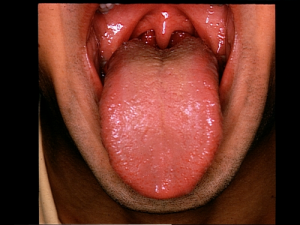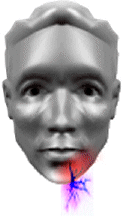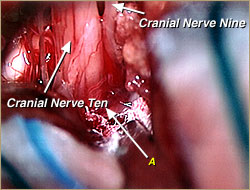Introduction
- Glossopharyngeal neuralgia involves severe pain generated by pressure from a tumor, an artery, a vascular malformation or unknown causes on the ninth cranial nerve.
Symptoms
- Symptoms include a severe, lancing series of electrical-like stabs near the tonsils or the back of the tongue on one side. The pain may also radiate to or originate in the ear. Swallowing triggers the pain.
- During severe attacks the patient may sit motionless, head flexed forward, allowing saliva to freely drool from the mouth.
- Cardiac arrest, syncope (fainting) and seizures have been associated with attacks of glossopharyngeal neuralgia.
- Except for the location of the pain and the stimulus for the pain, the attacks are identical to trigeminal neuralgia .
Treatment
- Pain may be reduced by injection of cocaine into certain skull structures.
- Medical therapy with phenytoin or carbamazepine gives some patients short-term pain relief.
- Usually, the persistence and severity of pain requires surgery to cut some of the nerve fibers.
- In some cases, microvascular surgery can move the blood vessel causing pressure away from the nerve.
Outcome
- Although there are some operative risks, the results of sectioning the ninth cranial nerve are uniformly excellent for total pain relief from glossopharyngeal neuralgia.








